Summer Research in 2019 Has a World View
Manhattan students who completed projects this summer presented their findings to the public on Sept. 26-27.
Curiosity is at the heart of the greatest innovations; the summer research projects at Manhattan College prove this. Students who completed research this year from the O’Malley School of Business, and the Schools of Education & Health, Engineering, Liberal Arts and Science aim to solve problems affecting real people and the planet; their projects examine life itself.
This year's Summer Research Scholars presented their findings on Sept. 26 and 27. The poster session took place on September 26 from 4 p.m. – 8 p.m., and Richard Carbonaro, Ph.D., associate professor of chemical engineering, delivered the keynote address at 4 p.m. The verbal presentations took place on September 27 from approximately 9 a.m. – 12:30pm.
Here are a few of the faculty-student summer research projects that were presented this year.
-
Paving the (Road)Way with Recycled Asphalt
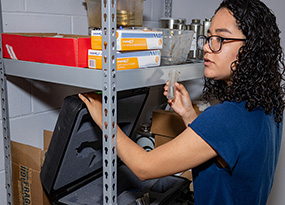
How can we build roads that last longer? Civil engineering student Odette Dominguez '21 and assistant professor Daniel Hochstein, Ph.D., offer rejuvenated recycled asphalt pavement as a possible solution. Since the issue with using recycled asphalt is that it’s often brittle and less durable, engineers softened the recycled material with cooking oil from the dining halls on campus and engine oil from cars. Their research, which took place in the Asphalt Pavement Laboratory, located in Mahan Hall, suggests that waste oil could be a component in developing more sustainable roadways.
-
Water and Air Quality in the Bronx
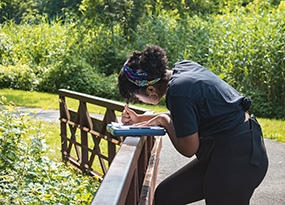
For her project, environmental science major Tatianna Peralta ’21 explored whether heavy metals affect Tibbetts Brook, a water body that flows from Yonkers, N.Y., to Van Cortlandt Park. She partnered with Yelda Balkir, Ph.D., associate professor of chemistry and biochemistry, and the Van Cortlandt Park Alliance to check the water for iron, manganese, calcium, zinc, and lead. Her purpose? To examine human impact on the environment. River water is used for many purposes such as irrigation, animal farming and habitat for fish and wildlife, and health of the water impacts the quality of our drinking water.
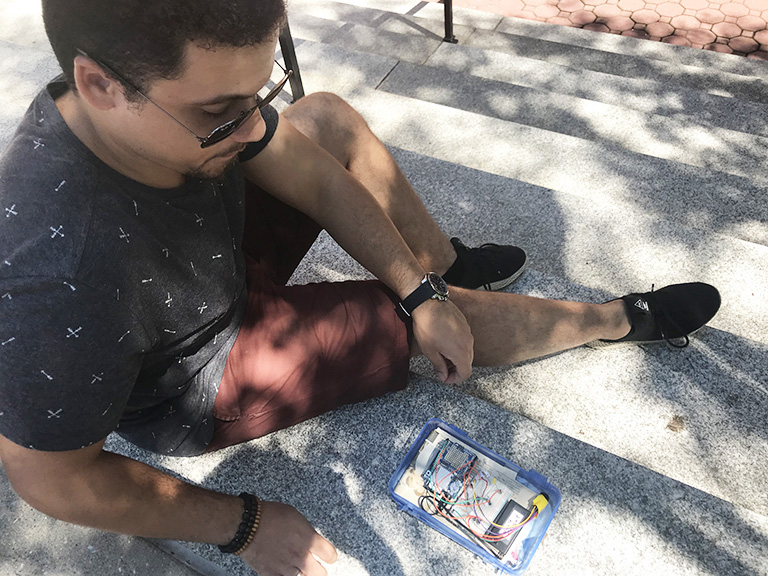 Jovan Gonzalez ’20, another environmental science major, is hoping to one day work in conservation and habitat restoration. He also has many family members in the South Bronx, where there are some of the highest asthma rates in the U.S. Under Balkir's advisement, Gonzalez spanned the borough this summer collecting air samples in areas including Mott Haven, Hunts Point and other neighborhoods. His air quality sensors detected carbon dioxide, UV rays, humidity and other pollutants.
Jovan Gonzalez ’20, another environmental science major, is hoping to one day work in conservation and habitat restoration. He also has many family members in the South Bronx, where there are some of the highest asthma rates in the U.S. Under Balkir's advisement, Gonzalez spanned the borough this summer collecting air samples in areas including Mott Haven, Hunts Point and other neighborhoods. His air quality sensors detected carbon dioxide, UV rays, humidity and other pollutants. The second part of the research looks at hospitalizations in these areas to determine a correlation with air quality damage. “This project is personal to me. I want to know what kind of air my family is breathing and the effects it may have on them,” Gonzalez said.
-
Physical Exercise to Improve Your Memory
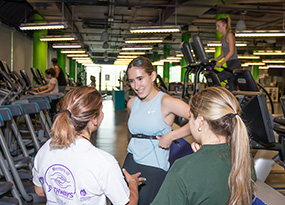
Exercise science majors Katherine Kalaj ’20 and Madison Doyle ’21 compared the effects of jogging and other moderate intensity aerobic exercise to high intensity interval training, such as burpees, on a person’s working memory.
In the Fitness Center, the students measured improvements in the participants’ reaction times, accuracy, and selective attention during and after both workout types. With assistance from Tedd Keating, Ph.D., associate professor of kinesiology, they plan to use information from the study to provide Manhattan University and the wider Bronx community with the best exercise programs for improved cognitive function.
-
Speeding Up MRI to Improve Patient Experience
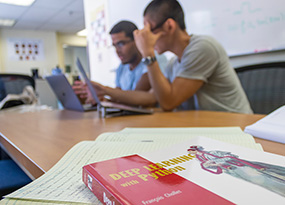
Mathematics students Quinn Torres ’20 and Marcus Wong ’21, and professor Angel Pineda, Ph.D., addressed a perceived problem with their research. Magnetic Resonance Imaging (MRI) technology, while a versatile imaging method for seeing inside the human body, is often slow. Accelerating MRI would decrease patient discomfort and medical costs.
The students spent the summer using deep learning – a machine learning method that creates clinically useful images with less data – in combination with the computer programming language Python, mathematics and statistics, to explore both data and algorithms.
-
Music and the Brain

Naomi Uy ’20 is studying psychology and music, which laid the ideal foundation for her academic research with Maria Maust-Mohl, Ph.D., assistant professor of psychology. Focusing solely on tuning frequencies emitted by string instruments, Uy wanted to find whether certain sounds were more pleasing to the human ear. As part of the study, participants listened to music clips recorded and produced in part by Uy, who is president of both the Manhattan University orchestra and Music Ministry.
Afterward, she examined their emotional and physiological reactions using skin response and heart rate sensors.